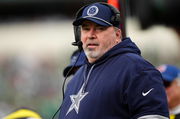
Imago
Imago

Imago
Imago
Golf has always prided itself on history: the Masters’ green jacket, the Claret Jug, Augusta’s hush at sunrise. Tradition was the currency. Reverence, the language. Not anymore.
Watch What’s Trending Now!
Today, golf is living in the FedExCup era, where the commas on the paycheck can rattle your imagination almost as much as the putts that decide them. And in 2025, it was Tommy Fleetwood who cashed in.
The 34-year-old “almost man” of majors finally rewrote his story at East Lake. After 164 starts and years of sympathy, he collected something better: the biggest single payday the PGA Tour has ever dared to offer. Fleetwood walked away with $10 million from a $40 million TOUR Championship purse, alongside the FedExCup title—a season-long prize pool worth $100 million. For a career already worth $33.4 million in earnings, it was a transformation. The FedExCup has become golf’s Super Bowl of sponsorships. And none of it exists without FedEx.
ADVERTISEMENT
The origins of a billion-dollar bet
Before 2007, golf drifted into silence after the majors. Then FedEx stepped in, creating the FedExCup playoffs, a four-tournament postseason that whittles 144 players down to 30 at East Lake.
The money escalated quickly:
ADVERTISEMENT
| Years | Total Prize Pool | Winner’s Share |
| 2007–2018 | $35M | $10M |
| 2019–2021 | $60M | $15M |
| 2022–2023 | $75M | $18M |
| 2024 | $100M | $25M |
| 2025 | $100M | $10M |
Top Stories
UFC 324 Payouts: How Much Will Justin Gaethje, Paddy Pimblett, Sean O’Malley, and Others Earn?

Pittsburgh Steelers Make Final Mike McCarthy Decision as Aaron Rodgers Gets His HC Wish

Sources: Bears Emerge as Suitors for Travis Etienne Jr., Chargers Expected to Cut Mekhi Becton, Toledo QB Not Focused on NFL

Fans in Awe as Wholesome Blades Brown Moment Is Caught on Camera

Fans in Disbelief as Mysterious Figure Around Scottie Scheffler Is Caught on Camera: “Got a Hex Him”

Michael Chandler Finally Moves On From Conor McGregor After Dana White’s Firm Verdict

So why did FedEx choose golf as its stage?
ADVERTISEMENT
Golf delivers exactly what FedEx wanted: prestige, reach, and an upscale audience. In 2025, PGA Tour broadcasts on CBS averaged 2.969M viewers, up 17% year-over-year. To a logistics giant selling consistency, that’s like draining a 40-footer in FedEx purple.
FedEx went all-in: a 10-year deal (2017–2027), record prize boosts, community initiatives, and global campaigns. The result? FedEx fused with golf so tightly that it now belongs alongside sport’s most iconic sponsorships:
- Coca‑Cola + Olympics = global celebration on tap.
- Visa + FIFA = trust with unlimited mileage.
- Emirates + Formula 1 = prestige, horsepower, and sky‑high branding.
ADVERTISEMENT
And then there’s FedEx + PGA Tour—a partnership built from scratch. But rewriting the rules of golf’s endgame came with consequences. It sparked something bigger than the game itself: a high‑stakes corporate arms race where logos fight as hard as players.
When sponsors play the FedEx Cup, too, in golf
When the FedExCup playoffs tee off, it isn’t just golfers locked into high‑pressure duels. It’s brands too, each fighting to plant their logo in front of one of the wealthiest, most loyal fanbases in sports. And like the players themselves, not every sponsor comes with the same firepower. Some grind for visibility, others have already won the luxury equivalent of a major championship.
ADVERTISEMENT
Here’s how the battlefield looks:
- Rolex: The quiet heavyweight. Rolex has been the Official Timekeeper of all three playoff events since 2007, including the TOUR Championship at East Lake. That position secures branding on every leaderboard, every on-site clock, and every broadcast graphic. Rolex has also been aligned with the PGA TOUR since 1967, giving it category exclusivity that few rivals can touch.
- Mastercard: A consistent player since the early 2000s. Mastercard became the title sponsor of the Arnold Palmer Invitational in 2004 and remains an Official Marketing Partner of the PGA TOUR in 2025.
- Citi: A newer entrant with a targeted strategy. In 2022, Citi signed on as Global Partner of the Presidents Cup, one of the PGA TOUR’s premier team events. Instead of pouring money into East Lake, Citi doubled down on community programs, executive-facing hospitality, and corporate partnerships.
- Mercedes-Benz: For years, Mercedes was the PGA TOUR’s “Official Vehicle” until Genesis slid into the driver’s seat in 2016. But Mercedes didn’t stall out; it pivoted. Since 2008, it has hitched itself to the most iconic stop in golf: The Masters. In 2025, that’s still its flagship sponsorship.
- Coca-Cola: Atlanta‑based Coca‑Cola has been pouring itself into the TOUR Championship since 2002, tying golf’s season finale to its backyard roots. But in 2024, it upped the ante: buying exclusivity across hydration. Now Powerade, BODYARMOR, and Smartwater dominate the category.
And it’s not just about logos. These brands leverage the FedExCup’s audience like no other.
ADVERTISEMENT
Why does it matter?
The FedExCup is more than marketing airtime. It functions on three powerful dynamics:
Demographics = Luxury goldmine
Golf pulls the exact audience upscale brands crave. Two‑thirds of golf fans see luxury goods as premium quality. Nearly half are willing to pay more, and 78% of high‑income individuals follow golf, blowing past sailing (59%) and tennis (29%). In short, golf delivers the C‑suite in golf polos.Duration = Living ads
Three tournaments over a month. Week after week. Unlike the Super Bowl, which gives 30 fleeting seconds, the FedExCup is sustained primetime: a living, breathing campaign that stretches for weeks.Scarcity = Status
From 70 players to 30 at East Lake, the structure of the FedExCup signals exclusivity. For brands, making it inside that cut is its own trophy.
ADVERTISEMENT
The reality?
These partnerships aren’t neutral. They’re designed as blockades. Rolex bars Omega. Coke shuts out Pepsi. Citi keeps Chase off the tee box. Genesis displaced Mercedes. Each deal is as much about denial as it is about exposure. The truth is simple: golfers provide the drama, but brands provide the engine. Without sponsorship, the FedExCup doesn’t exist. With it, the postseason has become bigger, richer, and more exclusive, the perfect corporate arms race, staged on emerald fairways.
ADVERTISEMENT
Impact on the game’s growth
When the FedExCup debuted, it gave the PGA TOUR something it never truly had: a season‑long finish line. By adding a points race, high‑stakes playoffs, and a definitive finale at the TOUR Championship, golf gained what every major sport needs.
But FedEx didn’t just drop billions in sponsorship money. It delivered structural change:
A true playoff system culminating at East Lake.
Career‑defining stakes with massive bonus pools.
Season‑long engagement that glued fans to the leaderboard until the final putt.
Players now plan their seasons around FedExCup points, aiming to qualify for the top 30 at East Lake. By 2025, the Tour Championship featured a $40 million purse payout that rivals NFL quarterbacks and reflects how the FedExCup has reshaped golf’s financial ecosystem. Even midfield finishers now leave with $500,000 or more, making earnings a powerful retention tool.
The FedExCup has also transformed golf globally:
- Player Retention: Mega payouts keep top stars loyal, limiting rivals like LIV Golf.
- Globalization: Players like Tommy Fleetwood, Justin Rose, and Rory McIlroy shine on a worldwide stage, boosting the TOUR’s prestige across continents.
- Sponsor & Media Expansion: FedEx’s billion‑dollar investment fueled prize growth, global TV rights, and luxury brand partnerships, making golf attractive to premium advertisers.
- Career Impact: FedExCup standings directly shape exemptions, eligibility, and signature event access, making consistency as valuable as individual wins.
Of course, not everyone’s sold. For every fan dazzled by $100 million bonus pools, some purists fear that tradition and major‑tournament prestige are being overshadowed by money and spectacle. But for players chasing career-defining rewards, the FedExCup has changed everything.
Impact on players from FedExCup’s high prize money
The FedExCup isn’t just a trophy; it’s a career accelerator, financially and competitively.
Historic Payouts: In 2025, Tommy Fleetwood collected $10 million for winning the TOUR Championship and overall FedExCup, early matching what he had accumulated in 12 years and 164 starts ($33M over 164 starts). Even mid‑field playoff finishers now pocket six‑figure checks, while top‑10 regular‑season performers secure multimillion‑dollar bonuses.
Consistency as Currency: The Cup rewards season‑long performance. Instead of chasing one‑off wins, players map their schedules around points, playoff qualification, and positioning. That shift has elevated week‑to‑week competitiveness.
Career Security: Strong finishes come with practical rewards: multi‑year TOUR status, automatic entry into majors, and guaranteed spots in signature events.
Brand Value: FedExCup visibility elevates players off the course, too. Winners and contenders become magnets for endorsement giants. Rory McIlroy with Mastercard, Tiger Woods with Rolex, proves that consistency on the course converts directly into brand equity.
That brings us to a bigger comparison: how does golf’s money-driven system stack up against other major sports?
Golf vs. NFL/NBA playoffs: Trophy vs. check
In the NFL and NBA, playoffs are all about legacy. The Super Bowl and the Larry O’Brien Trophy define greatness. The player bonuses? Players on the 2025 Super Bowl-winning team received a bonus of approximately $171,000 each. And in the NBA? About $300,000 each as part of their playoff bonus share, that is $34.7 million. Nice, but let’s be honest, that barely buys you floor seats in your own arena. What fans really remember are rings, parades, and awkward champagne goggles. Championships create immortality; the money is… beer money. But Golf’s FedExCup flips that narrative on its head.
In 2025, Tommy Fleetwood’s first PGA TOUR win went viral not for the trophy (most fans couldn’t even draw it from memory), but because he wired $10 million straight into his account. The Cup doesn’t have a rich history like Augusta, and nobody feels sentimental about FedEx’s shiny silver urn. But if you’re a player who cares about misty‑eyed when the check has that many zeros. And that’s the tension: can money ever match legacy in sports? Or will the FedExCup forever be remembered as golf’s biggest payday?
The truth is, the FedExCup will never define a career the way a major does. Win the Masters or U.S. Open and you’re immortal; win the FedExCup and you’re rich. It’s golf’s sponsor‑driven playoff, built for TV and powered by wire transfers so big they make Wall Street blush. It may not carve legacy, but it proves how money has rewritten golf’s DNA. And in today’s game, players aren’t choosing between prestige and payouts. They’re chasing both: the green jacket and the green stacks.
In 2025, the FedExCup proved one thing: in golf, legacy may whisper, but money now roars.
ADVERTISEMENT
ADVERTISEMENT
ADVERTISEMENT